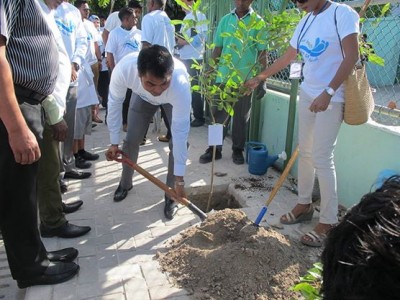The World Bank predicts a positive outlook for the Maldivian economy in 2014 with a projected GDP growth of 4.5 percent, according to its annual global economic prospects report.
Economic growth would be “driven by strong tourist arrivals, particularly by robust growth in the Chinese tourist segment,” observed the report released last week.
“In the medium term, the economy is projected to grow at a more sustainable pace of about four percent annually, as tourism revenues from Europe pick up.”
The report did warn, however, that an increasingly likely El Niño conditions in the regions represented a medium-term economic risk.
GDP growth in 2015 and 2016 is projected at 4.2 percent and 4.1 percent respectively.
The Maldives Monetary Authority (MMA) had revealed earlier this month that economic activity expanded in the first quarter of 2014 “driven by the strong growth of the tourism sector during the ongoing high season of the industry.”
Total tourism receipts in the first three months of the year increased by 10 percent compared to the first quarter of 2013, reaching US$801.1 million.
The central bank noted that the 10 percent annual increase in arrivals during the first quarter was “entirely driven by the significant increase (24 percent) in arrivals from the Chinese market.”
Chinese tourists accounted for 27 percent of guests during the first quarter of 2014. Europe however retained the largest market share despite the continuing growth of the Chinese market, accounting for of 51.3 percent of all arrivals.
Challenges and risks
In late May, a delegation from the World Bank led by the World Bank Vice President Philippe Le Houérou – in his first visit to the Maldives since assuming the post in July 2013 – met President Abdulla Yameen and agreed to work with the government in developing a national strategy for fostering growth and consolidating public finances.
The discussion focused on “the need to reduce fiscal deficits, create a favourable investment climate for the private sector and delivery of key public services,” according to a press release from the World Bank.
“Maldives has enjoyed economic growth during the last decade and expects to achieve 4.5 percent growth in 2014,” Le Houérou was quoted as saying.
“But it still faces challenges, such as balancing public accounts while delivering public services on some 200 islands across hundreds of kilometres of the Indian Ocean. The issue is how Maldives can make the most of its potential in order to achieve inclusive and sustainable development.”
In May, MMA Governor Dr Azeema Adam called for “bold decisions” to ensure macroeconomic stability by reducing expenditure – “especially the untargeted subsidies” – and increasing revenue.
El Niño
The global economic prospects report meanwhile warned that impending El Niño weather conditions could be “a key medium-term risk” for growth in the South Asia region.
In 1998, catastrophic El Niño bleaching killed 95 percent of the Maldives’ corals – a key attraction for tourists – following three months of unusually high seawater temperatures that year.
The World Bank report noted that as of May “the likelihood of El Niño conditions in 2014-15 was assessed at 60-70 percent.”
“Strong El Niño conditions resulting in deficient rainfalls or drought can have more significant impacts. Although ample grain stocks should mitigate adverse effects on food security, weak agricultural performance could keep food inflation, and in turn, retail inflation, high—perhaps necessitating a tighter monetary policy stance than otherwise, which may have adverse implications for investment and growth,” the report explained.
Among other risks for South Asian economies were “stressed banking sectors” and slow pace of institutional reforms as well as geopolitical and financial risks.
“Given the reliance of the South Asia region on imported crude oil, it remains vulnerable to political developments in Ukraine and Russia that could result in tighter international oil supplies,” the report cautioned.
“An escalation of geopolitical tensions that cause crude oil prices to spike can significantly impact current account sustainability in the region.”
Other external risks include declining capital flows from high income countries – which could have “adverse effects on exchange rates” – and a sharp slowdown in China’s economic growth, which would “represent a risk for the global economy, and in turn, for regional growth prospects.”
